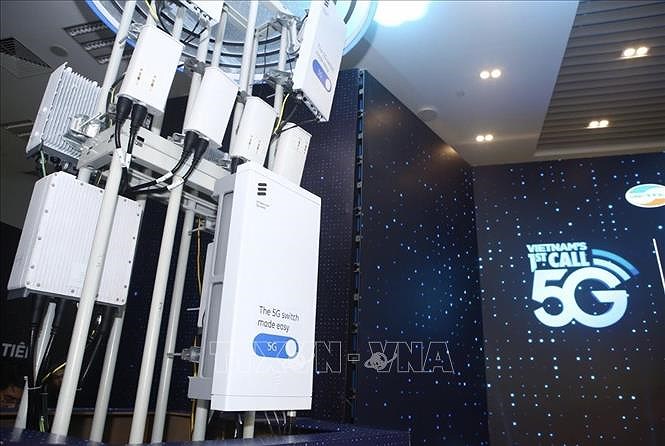Vietnam is now increasingly emerging as a regional middle power, especially in the global supply chain and development of 5G technology, according to an article published by the UK’s website strifeblog.org on April 13.
 Vietnam is speeding up the implementation of 5G technology (Photo: VNA)
Vietnam is speeding up the implementation of 5G technology (Photo: VNA)Hanoi (VNA) - Vietnam
is now increasingly emerging as a regional middle power, especially in the global
supply chain and development of 5G technology, according to an article published by the
UK’s website strifeblog.org on April 13.
The article writes that in the early 1980s, Vietnam was
one of the poorest places on earth. This situation changed in 1986, when the
country opened to the world and launched a set of reforms known as “Doi Moi”
(renewal). These reforms quickly boosted the economy and attracted massive foreign
direct investments. If a few years before Vietnam had had to import rice from
abroad, by 1989 it had become the second largest rice
exporter in the world.
Over recent decades, Vietnam has
presented itself as a good international citizen, earning recognition and
respect within the Association of Southeast Asian Nations (ASEAN). It has signed a wide array of bilateral trade agreements, while joining the WTO, the Comprehensive and Progressive Agreement for
Trans-Pacific Partnership (CPTPP), and recently, the Regional Comprehensive
Economic Partnership (RCEP).
In 2019, it took a mediating role in global
diplomacy by hosting the second DPRK-USA summit in Hanoi, and in
2020 it assumed the ASEAN chairmanship while successfully handling the COVID-19 pandemic. Hanoi was in fact
praised for giving one of the world’s best responses to the pandemic, quickly introducing a
massive programme of contact tracing while mobilising the Vietnamese society in a
collective fight against the virus.
These factors suggest that
Vietnam is walking the path of a rising middle power, reflected in its role in the
global supply chain and the realm of 5G technology.
Vietnam has many advantages
thanks to its ability to offer solid infrastructure coupled with a large
low-wage workforce. Nike and Samsung have been outsourcing their production to
Vietnamese factories for years, and recently Apple has started to assemble its AirPod earphones on Vietnamese soil too.
According to the article, in the
field of technological development, Vietnam built its own domestic infrastructure
and appears ready to deploy it for commercial use by 2021. Viettel, a Vietnamese state-owned telecom company, has
collaborated with Ericsson to create its own 5G technology, and plans to expand
the product to Myanmar, Laos and Cambodia.
Vietnam has also provided a
cheap mass access to the Internet for its citizens, while aiming to become a key player in e-commerce and online payment methods.
After Ericsson, Nokia, Huawei, Samsung and ZTE, Viettel is the sixth producer
in the 5G race, an impressive result for a country that 40 years ago was not
able to keep up with food shortages.
The
article concludes that, a latecomer to the international community, Vietnam is
now increasingly emerging as a regional middle power as the country is
well-integrated in the world economy and
it is one of the only domestic producers of 5G technology./.